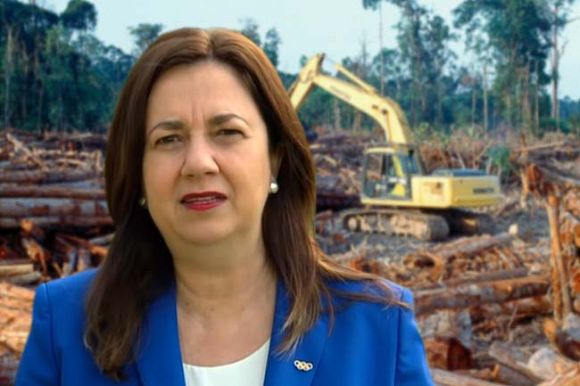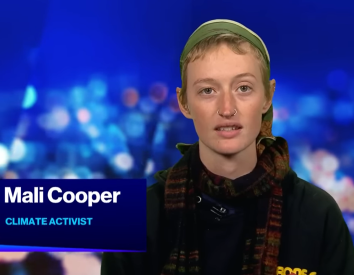Greg isn’t allowed to associate with himself.
A "non-association order" is a list the police can include in your bail conditions. It contains names of individuals you mustn’t communicate with. It’s the kind of thing they might use for co-conspirators in a crime, or members of a gang.
But Greg’s just someone who went out in support of a Blockade Australia action: so his heinous crime is standing around where cars were meant to be. And now his name is listed on his own non-association order.
“I feel like I’m going to get arrested for looking in the mirror,” he said.
This might be funnier if we didn’t have to worry that they might actually do it. Anyone involved in the recent week of Blockade Australia mobilisations in Sydney – famed now for a brief traffic blockage and an overwhelming police response – are suffering through a range of inept and dangerously overbearing bail conditions.
When Greg was first released from jail after participating in Blockade Australia’s week of protest in Sydney, he was residing at an address in Bega. Police officers visited him to do a bail check. They remarked that his bail papers said he wasn’t allowed to be in the state. Even though his place of residence was in NSW.
He said:
“They told me, ‘technically we could take you in because your address is NSW.’ They were laughing about it. They thought it was hilarious.”
Greg’s managed to relocate away from NSW now, so he won’t get to enjoy more of this police humour for the time being.
Again: this stupidity would be novel if we could rest assured that police wouldn’t take advantage of it. But they do.
Mali Cooper – the activist who incensed every Daily Mail reader on the continent for locking herself to a car on a Sydney road – had a bail condition requiring her to report to her local police station, in Lismore, by Thursday morning. But she was arrested just after midday on Wednesday by coppers in Sydney, who "estimated" that she wouldn’t be able to drive back to Lismore in time.
It takes eight hours to get there by car, so of course she could have, but that isn’t the kicker.
The kicker is that after the floods, there is no Lismore police station. So Mali reports in via phone.
It doesn’t make any sense, but it doesn’t have to. “It was about lowering the energy as much as possible,” Greg reflected. He and his comrades, including Mali, have undertaken actions at ports that have essentially suspended fossil fuel industry operations, however temporarily. “I think that in Port Botany we cost some rich people some money. They’ve been on the phone. Now the police are going hard against us,” he said.
One activist was pulled over and had his car searched. NSW Police found a texta in the car and asked him why he had it. He told them he was an artist. They asked him where the rest of his art materials were. He didn’t have any in his car but he was gracious enough to show them his art Instagram account. But if you’re a real artist you would have all of your art bits with you in the boot ("police logic"). They charged him for "possessing graffiti implements".
You don’t even have to know about Blockade to receive these conditions, apparently. After the Sydney action, NSW Police raided a random squat. Two people were there at the time and police arrested them for trespass, giving them all the abovementioned bail conditions.
They even had to surrender their passports. But as it happens, the two had nothing to do with Blockade Australia. They just happened to be in a squat at that time. Perhaps that gives off a Blockade-ish vibe to a cop.
Now they have a non-association order with a list of names they don’t associate with.
This is all pretty transparent: NSW Police are bending laws to intimidate and persecute anyone who attended Blockade actions. The aim is to burn out activists by tying them up with legal troubles and promote disengagement in the kind of ongoing civil disobedience that Blockade want to continue pursuing.
Max Curmi and Tim Neville spent weeks in prison before being released on bail. They were arrested at the camp that NSW Police first stalked, then raided, before the Sydney mobilisation. Tim’s charge was "conspiring to commit a crime", which carries the threat of jail time; but the crime in question is blocking traffic, which is only a fineable offence. For that, nonetheless, three and a half weeks without sunlight.
These bail conditions have human and digital rights watchers concerned. Activists who attended the Sydney action are barred from 'possessing or having access to an encrypted communication device and/or possessing an encrypted application media application'. The intention is to prevent them from coordinating via apps like Telegram, but in practice, it goes further than that. Digital rights watchers Electronic Frontiers Australia (EFA) recently posted that this would extend to prohibit the use of all communications technology.
I reached out to EFA for clarity on this and they said:
'The bail conditions communicated to us are written so broadly that we believe they would capture essentially any modern device because encryption is such a fundamental way of securing computing devices … We are also concerned that it compromises an accused person's right to communicate in private with their legal representatives.'
When Greg was in court, he asked the Magistrate about these conditions. He wanted to know if he could use his laptop. The Magistrate joked: “are you asking me a question about technology"? He looked to the rest of the court for assistance, but nobody could answer Greg’s enquiry. They didn’t know.
These conditions are too flimsy to stand being tested by lawyers. Consequently, Sydney City Crime, representing the activists in court, has already begun to see success fighting them.
For the activists, however, weeks of this harassment and ineptitude have taken their toll. “Whenever somebody’s at the door, my ears prick up a bit,” Greg said.
“I’ve always got my medication ready to go, thinking I might get whisked away at any time. It’s always there in the back of my head,” he said.
This kind of police conduct won’t stop future Blockade actions. But it’s exhausting, as it’s meant to be. The problem is that it isn’t just exhausting, it also involves bending the law to such an extent that it threatens the liberties of all activists.
As EFA put it:
“Australia needs to decide if it wants to be a liberal democracy, and then to act like one.”
Tom Tanuki is a writer, satirist and anti-fascist activist. Tom does weekly videos on YouTube commenting on the Australian political fringe. You can follow Tom on Twitter @tom_tanuki.
Related Articles
- Energy Minister Bowen frees ARENA from Coalition's fossil fuel mandate
- War wins the 'big bucks' while climate gets the 'change'
- CARTOONS: Coalition politicians clucking over climate change
- Democracy is failing to tackle the climate crisis
- UN doesn't 'hold out' hope Australia will act on climate change
 This work is licensed under a Creative Commons Attribution-NonCommercial-NoDerivs 3.0 Australia License
This work is licensed under a Creative Commons Attribution-NonCommercial-NoDerivs 3.0 Australia License
Support independent journalism Subscribe to IA.














